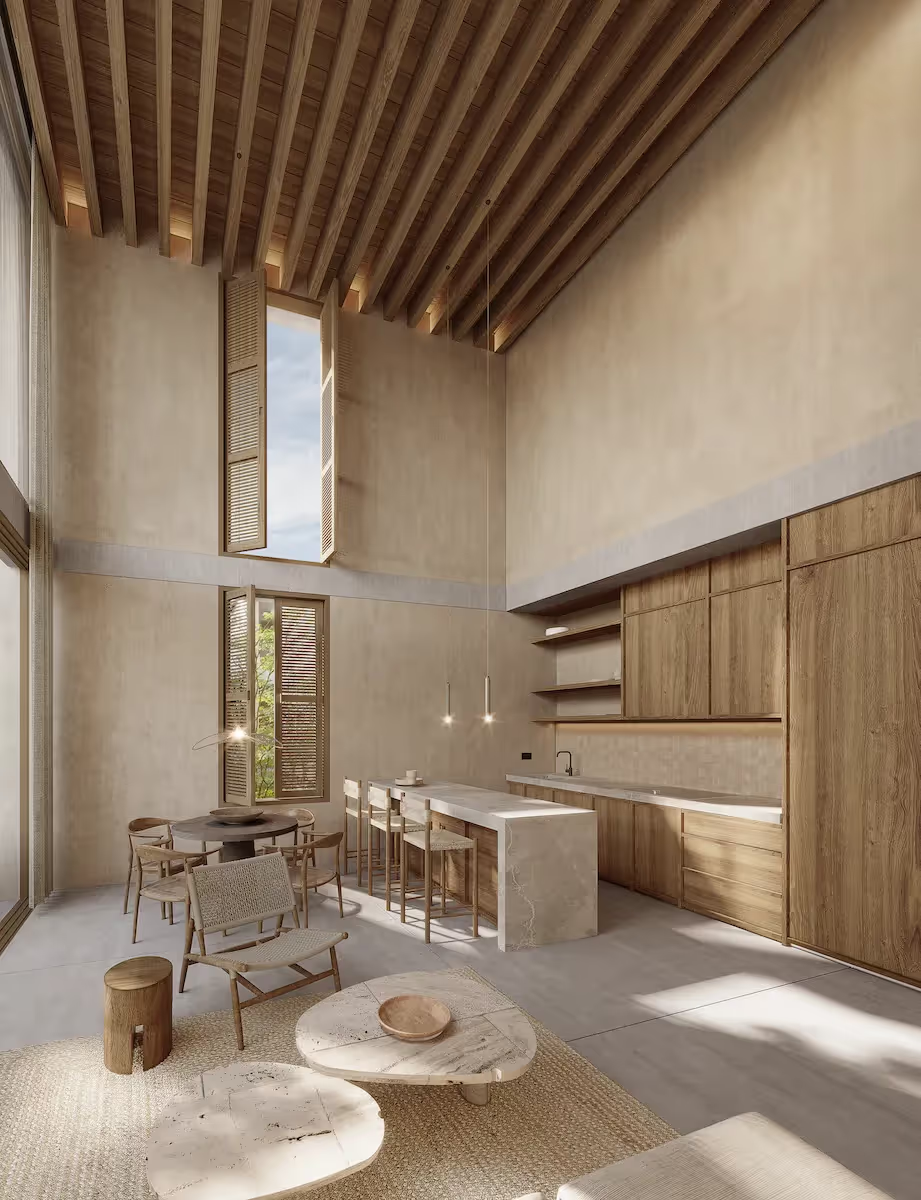Considering buying a property in Mexico? You’re not alone. With its stunning beaches, rich culture, and attractive real estate prices, it's no wonder real estate investment in Mexico has become increasingly popular among international buyers. Whether you're searching for a vacation home or seeking a savvy investment, buying property in Mexico offers many rewards.
Let’s explore the key steps and important details that will help make your property purchasing process a seamless experience.
1. Foreigners and Property Ownership in Mexico
Yes, foreigners can absolutely buy property in Mexico - but there are a few legal hurdles. Mexican law restricts direct ownership of land within certain areas known as the restricted zone. This includes land within 50 kilometers (about 31 miles) of the coast and 100 kilometers (62 miles) of international borders. However, don’t be discouraged, as you can own property in Mexico through Fideicomiso:
- Fideicomiso (Bank Trust): To own property in the restricted zone, foreigners can establish a fideicomiso through a Mexican bank. Essentially, the bank holds the title to the property in trust, but you retain full rights to use, lease, sell, and even pass on the property to your heirs. This trust is renewable every 50 years and functions similarly to full ownership.
- Mexican Corporation: If you plan on buying multiple properties or using the land for commercial purposes, you could also consider setting up a Mexican corporation. This allows for direct ownership, bypassing the fideicomiso altogether. However, this option is generally more suitable for business-oriented buyers.

2. The Role of a Mexican Notary
In Mexico, the notary is far more than a mere witness to signatures. In fact, the notary plays a central role in ensuring the legal aspects of a real estate transaction are handled properly. Notaries are government-appointed lawyers who verify legal ownership, ensure the property is free from liens, and oversee the transfer of the deed.
Their responsibilities include:
- Verifying the seller’s ownership and confirming that the property is free from debt, back taxes, or legal disputes.
- Preparing the official purchase agreement and title transfer.
- Registering the sale with the Public Registry.
Having a trusted notary ensures that the process moves smoothly and legally. Skipping this step or cutting corners could result in legal headaches down the road.
3. The Step-by-Step Process of Buying Property in Mexico
Navigating the Mexican property market might feel daunting at first, but once you understand the process, it becomes more manageable. Here’s what to expect:
Step 1: Find Your Dream Property
Start by narrowing down your desired location. Are you after a beach retreat in Tulum, a top choice for its stunning natural beauty and rental potential? If so, understanding what to look for before you buy property in Tulum can help you avoid costly mistakes and maximize your investment. Or perhaps you would prefer a colonial-style home in Merida, renowned for its rich history, architecture, and growing expat community.
For those drawn to urban life, Mexico City offers excellent investment opportunities, particularly in trendy neighborhoods like Roma and Condesa, known for their modern amenities and cultural vibrancy. The Pacific coastline, with places like Puerto Vallarta and Los Cabos, is perfect for those seeking luxury real estate and beachfront living.
Whether you’re prioritizing lifestyle or return on investment, each location has its perks. Working with a local real estate agent familiar with the Mexican market or a real estate developer will help you find the best property and avoid any potential pitfalls when choosing the best place to buy property in Mexico.

Step 2: Make an Offer
Once you’ve found your ideal property, you’ll make a formal offer. It’s common to negotiate the terms, such as the price and payment schedule. Once agreed upon, both parties will sign a Promesa de Compraventa - a binding sales agreement that outlines the specifics of the deal, including the sale price, closing date, and property specifications.
Step 3: Due Diligence
This is where the notary and your legal team kick into high gear. They’ll conduct a thorough check on the property to ensure it’s free of any legal issues, unpaid taxes, or encumbrances. Additionally, they’ll verify that all necessary permits are in place, particularly for properties in coastal or protected areas.
Step 4: Setting Up the Fideicomiso (if required)
For properties in the restricted zone, you’ll need to establish a fideicomiso with a Mexican bank. This process involves selecting a bank to act as the trustee and preparing the necessary documentation for the trust agreement. While the bank technically holds the title to the property, you, as the trust’s beneficiary, have complete control and ownership rights over the property.
Step 5: Closing
The final step is the closing, where the notary oversees the signing of the deed and the official transfer of ownership. This is also when you’ll pay your closing costs, which typically range from 6% to 7% of the purchase price. These fees cover notary services, taxes, and registration.
4. Costs Involved in Buying Property in Mexico
While Mexican real estate is often more affordable than in the U.S. or Europe, it’s important to budget for additional costs beyond the purchase price:
- Closing costs: As mentioned earlier, these typically range from 6% to 7% of the property’s value. They cover notary fees, registration fees, and taxes. For a more detailed breakdown of hidden costs, see our guide on buying a home in Tulum.
- Property taxes (predial): Mexico’s annual property tax is quite low, typically ranging from 0.1% to 0.3% of the property’s assessed value.
- Capital gains tax: If you eventually sell the property at a profit, you may be subject to capital gains tax. The tax rate is generally around 35% for foreigners, but some exemptions apply if the property was your primary residence.

5. Financing Options for Foreign Buyers
Although many foreign buyers opt to pay in cash, there are various options to finance real estate in Mexico. Some Mexican banks and private lenders offer mortgages to non-citizens, though interest rates tend to be higher than in the U.S. or Canada. Developers in certain regions, particularly for pre-construction condos, may also offer direct financing.
Additionally, many of these financing options for apartments can vary depending on the property's location and the lender's criteria. If you plan to use financing, be prepared to provide documentation such as proof of income, credit history, and residency status.
6. Why Invest in Mexican Real Estate?
Buying property in Mexico can be more than just a personal retreat - it can open the door to profitable property investments. Here’s why:
- Affordable real estate: Compared to many other countries, Mexico offers real estate at highly competitive prices, even in sought-after locations like Tulum and Playa del Carmen.
- Potential for high returns: Popular tourist destinations, particularly along the Riviera Maya, offer the potential for substantial rental income from short-term vacation rentals.
- Growing market: Mexico’s real estate market has seen steady growth, particularly in areas like Tulum, where demand from international buyers continues to increase. You can explore the top cities to buy property in Mexico to understand where demand is the strongest.

7. Final Tips for Foreign Buyers
To ensure a smooth and successful purchase, here are a few final pointers:
- Work with local professionals: Choose a trusted real estate developer, notary, and lawyer who are familiar with the local market and regulations.
- Understand the local Market: Real estate markets in Mexico vary significantly by region, so take time to research your chosen area.
- Know the legal process: Familiarize yourself with the legal requirements and ownership structures available to foreign buyers.
As a final note, if you're considering buying property in Mexico, Tulum should definitely be on your radar. Known for its pristine beaches, vibrant lifestyle, and strong rental market, Tulum offers fantastic opportunities for both personal and investment purposes. The town has seen rapid growth in recent years, making it a top destination for real estate buyers. Explore our offerings of condos for sale in Tulum to find the perfect property for your goals.









